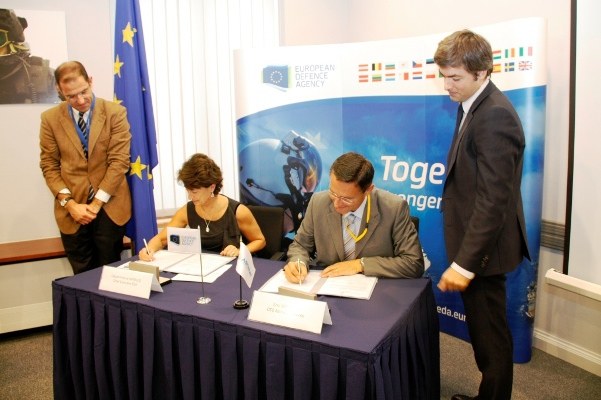Satellites: the European purchasing center is born
 (BRUXELLES2) It is with joy and good humor that the European Defense Agency (EDA) has just signed a contract with Astrium to launch the European cell for the acquisition of satellite communication services - or European Satellite Communications Procurement Cell (ESCPC) in English. Several Ministries of Defense will thus pool, from today, their acquisitions of commercial satellite communications services. The objective is to combat the fragmentation of demand "in order to reduce costs (more or less 10%), allow easier access and improve the efficiency of operationssaid Claude-France Arnould, General Manager of the Agency. Five countries have already indicated that they will participate in the initiative (France, Italy, Poland, Romania and the United Kingdom). But the Agency expects experience to prove to the most skeptical that the maneuver will not complicate things so much and will above all allow significant budget reductions. Especially since, despite difficult public financial situations, demand is on the rise. The use of applications devouring satellite information is becoming more and more common during military operations. And we think first of all of a growing drone market. The project is also intended to be flexible. The cell is at the disposal of the Member States and not at the disposal of the Union. They can thus decide to use the European structure for the purposes that suit them, whether at national level, in bilateral cooperation or within the framework of a NATO operation, and this on the basis of an invoicing in use. Principle of sovereignty requires! It should be noted that only European countries or countries associated with the Agency (such as Norway or Switzerland) will be able to join the maneuver, leaving behind them Denmark or Turkey for example.
(BRUXELLES2) It is with joy and good humor that the European Defense Agency (EDA) has just signed a contract with Astrium to launch the European cell for the acquisition of satellite communication services - or European Satellite Communications Procurement Cell (ESCPC) in English. Several Ministries of Defense will thus pool, from today, their acquisitions of commercial satellite communications services. The objective is to combat the fragmentation of demand "in order to reduce costs (more or less 10%), allow easier access and improve the efficiency of operationssaid Claude-France Arnould, General Manager of the Agency. Five countries have already indicated that they will participate in the initiative (France, Italy, Poland, Romania and the United Kingdom). But the Agency expects experience to prove to the most skeptical that the maneuver will not complicate things so much and will above all allow significant budget reductions. Especially since, despite difficult public financial situations, demand is on the rise. The use of applications devouring satellite information is becoming more and more common during military operations. And we think first of all of a growing drone market. The project is also intended to be flexible. The cell is at the disposal of the Member States and not at the disposal of the Union. They can thus decide to use the European structure for the purposes that suit them, whether at national level, in bilateral cooperation or within the framework of a NATO operation, and this on the basis of an invoicing in use. Principle of sovereignty requires! It should be noted that only European countries or countries associated with the Agency (such as Norway or Switzerland) will be able to join the maneuver, leaving behind them Denmark or Turkey for example.
For Astrium, it is also a great opportunity. The European company will become for the next three years the one-stop shop for Member States in the delivery of communication satellites. And for Europe, it is a supplier of first choice. "We know the market, what is available, and at what pricestated Eric Béranger, CEO of Astrium Services. Number one of the European space companies, it will be able to put its address book and all its technical and financial expertise at the disposal of the States, since it counts among other things today, among its non-European customers, the United States, Canada or even NATO. The initiative has also been welcomed by the satellite industry in general. "Companies are increasingly realizing that one program is better than no program at all“, explains Claude-France Arnould.
At the same time, the European Defense Agency is proposing the concept of Secure Satellite Telecommunications (SECTELSAT), a cooperative approach also inspired by the method of Pooling & Sharing. The principle consists of pooling national military communication satellites. Germany (Satcom-BW), Spain (SecomSat), France (Cyracuse III), Italy (Sicral) and the United Kingdom (Skynet 5) will thus share their military resources and will put these same resources at provisions of Member States that do not have these capacities. Also making them available, for example, to European missions. Lessons learned from anti-piracy operations (Atalanta) or EUFOR Chad-Central African Republic have shown the need for better connectivity. One billion euros should thus be able to be saved in joint investments for the years to come. Especially since the current satellite networks will arrive for the most part at the end of their lives between 2020 and 2025, leaving a capacity gap that will have to be filled according to financial restrictions.

